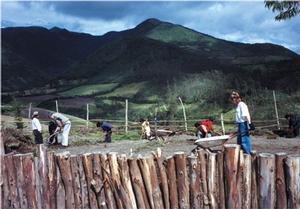Along with the weather, our second group of volunteers from the States also arrived. This lot were assembled through a Baptist church in Kentucky, and my community has never witnessed so much religious fervour. Between Samaritan-style help in our medical centre, school and vegetable plot, the congregation put on bible classes, showed faith-building videos, held a 'church' and generally tried to save souls.
One of the few supporters of the new church played the situation for all it was worth. His 'conversion' to the Baptist faith (one in a line of conversions for him) neatly coincided with his appeal for cash. Despite our warnings that the individual concerned was relatively well-off, the group didn't see through his Damascene pretensions and handed over the money.
In spite of their zealous religiosity, the group did bring some real benefits. Most significant was a $1500 hearing aid for five-year-old Eric, who has been almost completely deaf since birth. For Eric's mother this kind of money would have been unattainable, and it was a moving moment as she cried and said her thank yous.
Others were left with tears in their eyes after visits to the group's dentists. They provided sorely-needed help – largely by extracting rotten teeth. Patients emerged at ten minute intervals, unable to talk, with blood pouring from the recesses where earlier a tooth had been. Surprisingly, nearly all were happy to get their teeth pulled.
My real job this month has been to introduce 'bio-intensive' organic gardening to the school vegetable plot. This emphasises building good soil structure and close planting in narrow beds. Sounds great, but the downside is that each bed has to be dug twice: twice the effort, twice the amount of time preparing the soil, and twice the number of blisters on my fingers (I have eight on one hand as I write – fortunately none on the fingertips I type with).
We also took the time to build another fence to deter the persistent pigs, cows and dogs which had been trotting through the cabbage patch, eating or trampling over the cabbages we'd carefully planted before. Thankfully I had 16 person-days to work on the garden, and we now have a total of 10 seven-metre vegetable beds to work with.
We have added potatoes, kidney beans, corn, cauliflower, beetroot, onion, turnip and garlic to the radishes, carrots, swiss chard, lettuce and cabbages planted last month. We're set for a record harvest. Although it's not hard to beat our current best: six radishes, which caused much hilarity among the school kitchen staff ("How can we feed 70 schoolchildren on those?", they asked mockingly).
I had slightly less success with my attempts to grow our local tourist industry. I drove visitors to see the lakes at the top of the mountains, but they ended up walking the last quarter of the way, because the Land Rover died on us. Ironically, perhaps, it was the weight of the people themselves that was our downfall – they were all big Americans. Okay, I accept that loading ten people, plus dogs into a car as old as I am was unwise, but there wasn't an obvious alternative.
The last few miles up the mountain proved the final straw for the engine, which overheated and boiled off most of the radiator water. But the temperature gauge wasn't working and the guests in the back of the Land Rover thought the burning they could smell (which I couldn't) was normal and so didn't tell me about it.
I only found out there was a problem when the vehicle slowed, stopped and refused to start again. We had no way to contact anyone for help, so were lucky that when the engine cooled and we topped up the water it started again. With these slow-moving Americans, it would have taken four hours to get down.
Culinary highlight of this month was my first taste of roast guinea pig, Ecuador's most famous delicacy. They normally only serve it for special occasions because, pound-for-pound, it costs more than ten times as much as chicken. The special occasion in this case was some local bigwigs visiting the community.
Instead of the rabbit-like meat I'd expected, it was more like a very dry goose, with a thick layer of fat and only a very thin strip of meat. The meat itself was salty, dry and chewy. It tasted so bad that I had trouble finishing the small portion I'd been given (about a quarter-pig). The pigs were served decapitated. I learned afterwards that normally they turn up on your plate head-and-all. Diners fight over who gets a head.
Dr Jason Palmer, Mojandita, Ecuador.
Source
Building Sustainable Design




















